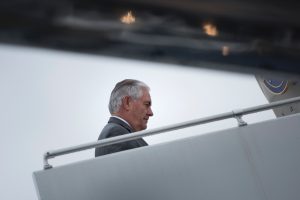
But as Tillerson left the Group of 20 meeting of foreign ministers Friday afternoon, there was a palpable sense of relief, mingled with lingering concerns about the direction of U.S. foreign policy in the Trump administration.
“Met a lot of people, made a lot of new friends,” Tillerson told reporters.
 Secretary of State Rex Tillerson, tight, Turkish Foreign Minister Mevlut Cavusoglu, second from right, and other diplomats listen to German Foreign Minister Sigmar Gabriel, third from left, at a meeting on Syria at the World Conference Center in Bonn, Germany. (Pool photo by Brendan Smialowski via Reuters)
Secretary of State Rex Tillerson, tight, Turkish Foreign Minister Mevlut Cavusoglu, second from right, and other diplomats listen to German Foreign Minister Sigmar Gabriel, third from left, at a meeting on Syria at the World Conference Center in Bonn, Germany. (Pool photo by Brendan Smialowski via Reuters)Asked if he was taking any messages back to the president, he replied “Many” but declined to elaborate.
[Trump’s travel ban could make Tillerson’s job harder]
After Tillerson departed, the German and French foreign ministers said they welcomed his involvement in a meeting on Syrian peace talks due to restart next week. There had been concerns that the United States would tolerate the continued rule of Syrian President Bashar al-Assad in favor of an all-out effort to defeat Islamic State militants.
“I believe it is important and absolutely instrumental to have a close dialogue with the United States on the Syria issue and on many other issues,” French Foreign Minister Jean-Marc Ayrault told reporters.
German Foreign Minister Sigmar Gabriel said that Tillerson “participated vigorously” in the discussion on Syria and that the U.S. allies were assured that Washington backs dialogue, not just military force.
“All the participants want a political solution, because a military solution alone won’t lead to peace in Syria,” Gabriel said.
Diplomats said they got the sense that there would be no radical shift in the U.S. stance toward Russia, despite Tillerson’s friendship with Vladimir Putin and Trump’s repeated praise of the Russian president.
One diplomat, speaking on the condition of anonymity, said the participants were encouraged when Tillerson said the administration believes that before it can consider any lifting sanctions against Russia, Moscow must meet its commitments to help end the fighting in the Russian-speaking, separatist region of eastern Ukraine.
Russian Foreign Minister Sergei Lavrov characterized his discussions with Tillerson, whom he had never met before, as “pragmatic and businesslike.”
“We reaffirmed the existence of similar or identical interests, primarily with regard to the irreconcilable struggle against terrorism in the context of our cooperation within the political settlement in Syria and other countries where terrorism has taken root,” Lavrov said in a statement posted on the Foreign Ministry homepage. “We also discussed the situation in Afghanistan and Ukraine. Our American partners have expressed interest in joining the efforts that are being taken to settle these conflicts.”
[Tillerson tells State Department employees he values their work]
Tillerson reportedly had a cordial meeting with Chinese Foreign Minister Wang Yi, despite Trump’s breach of the one-China policy when he took a phone call from the leader of Taiwan before his inauguration.
State Department acting spokesman Mark Toner said Tillerson expressed concern about North Korea’s nuclear and missile programs and urged China to help “moderate” its neighbor’s behavior.
Speaking later Friday at a security conference in Munich, Wang cautioned against a confrontational approach to the rogue nuclear power.
Since 2009, when talks with North Korea broke down, “the nuclear issue on the peninsula has embarked on the path of confrontation, and we’ve been seeing nuclear tests and then sanctions, and sanctions and then nuclear tests,” Wang said. “This is a bad circle and should be stopped, because the ultimate result of such a circle could be a lose-lose result for all parties, and no one can bear the outcomes.”
Separately, Wang warned against any souring of relations between China and the United States. Wrong choices in global affairs in the past have led to “fire and blood,” he said.
“We need to remain committed to multilateralism,” Wang said. “If big countries get along, the world enjoys peace and stability.”
Michael Birnbaum in Munich contributed to this report.
https://www.washingtonpost.com/world/europe/tillerson-eases-concerns-over-foreign-policy-under-trump/2017/02/17/8a20acfc-f2fd-11e6-9fb1-2d8f3fc9c0ed_story.html?utm_term=.91c766782eca



